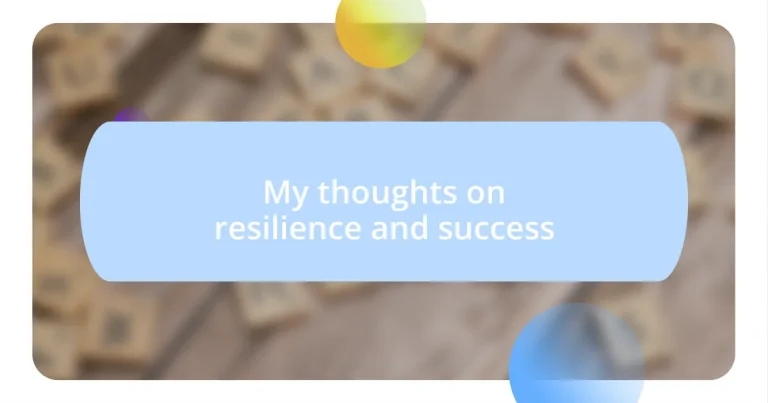Key takeaways:
- Resilience is not just about recovery but also about personal growth through adversity and learning from failures.
- Mental toughness, including a positive mindset and emotional resilience, is crucial for overcoming challenges and achieving goals.
- Building a resilient mindset involves embracing discomfort, setting realistic goals, and cultivating a supportive network.
- Sharing experiences and lessons learned from setbacks fosters community and enhances personal connections.
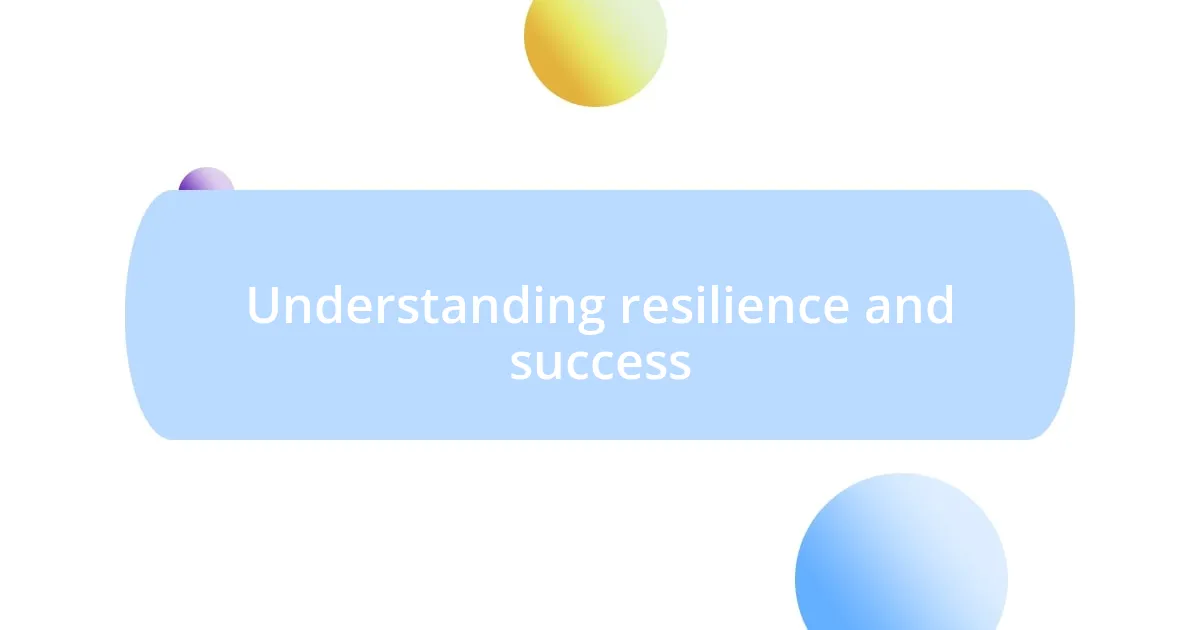
Understanding resilience and success
Resilience and success often go hand in hand, yet they can feel like distant concepts. I remember a time when I faced a significant setback in my career—a project I had poured my heart into fell apart. In those moments, I questioned whether success was truly attainable, but what I discovered was that the lessons learned from failure offered insights that propelled me forward.
It’s interesting how resilience isn’t just about bouncing back; it’s about growing stronger through adversity. Each challenge I’ve faced has shaped my perspective, teaching me that success isn’t a linear path. I’ve met individuals who truly embody this idea—those who’ve faced personal tragedies, yet went on to inspire others. Have you ever thought about how your toughest experiences could actually fuel your future achievements?
Success can often be viewed through a narrow lens, focusing solely on external validation—titles, accolades, or wealth. However, in my experience, true success is deeply personal. It’s about setting goals that resonate with our values and finding the courage to pursue them, even when the journey gets tough. I sometimes wonder, what does success look like for you?
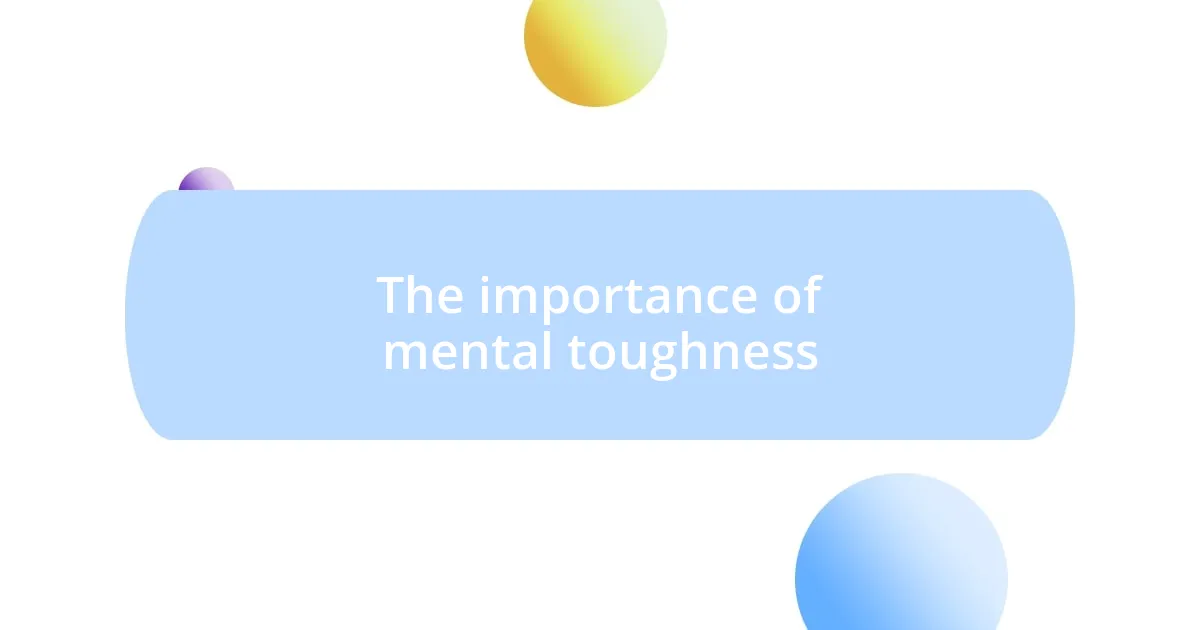
The importance of mental toughness
Mental toughness plays a crucial role in overcoming challenges and achieving our goals. I vividly remember a time when I was preparing for a marathon. The training was grueling, and there were days when I felt utterly defeated, especially when I hit the wall around mile 18. It was my mental toughness, that inner resolve, which pushed me beyond my physical limits and helped me cross that finish line.
In my observations, individuals with mental toughness tend to view setbacks as stepping stones rather than insurmountable obstacles. This mindset shift can often make all the difference. For instance, I’ve seen colleagues who encounter failures in their projects openly analyze what went wrong, adapting their strategies, and emerging even stronger next time. This ability to bounce back, find strength in struggle, and persist is what sets them apart.
Moreover, mental toughness fosters resilience and contributes to overall well-being. I’ve noticed how important it is to cultivate this trait—whether it’s through mindfulness, supportive relationships, or simply finding joy in the process. Although it can feel lonely at times, having mental fortitude means trusting oneself through the uncertainty, and that is a powerful lesson I carry with me daily.
| Mental Toughness | Impact |
|---|---|
| Emotional Resilience | Ability to recover from set-backs and maintain a positive outlook |
| Self-Discipline | Commitment to goals even when motivation wanes |
| Growth Mindset | Viewing challenges as opportunities for learning and development |
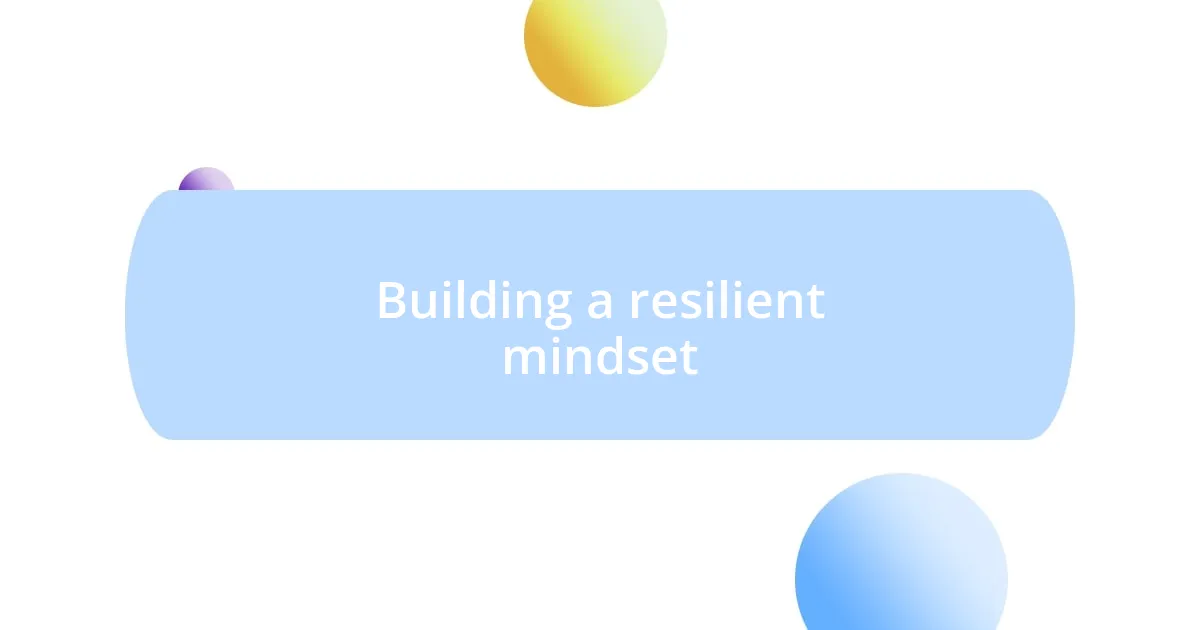
Building a resilient mindset
Building a resilient mindset requires intentional effort and a willingness to embrace discomfort. I’ve found that regularly stepping outside my comfort zone has been one of the most effective ways to build resilience. A memorable moment was when I took on a public speaking engagement despite my fear of failure. Afterward, I realized that the anxiety I felt was a precursor to growth, which opened up new opportunities I hadn’t considered before.
To nurture this resilient mindset, consider these strategies:
– Embrace change: View change as an opportunity rather than a threat.
– Practice self-compassion: Treat yourself kindly when facing setbacks, like you would a friend.
– Cultivate a support network: Surround yourself with people who uplift and challenge you.
– Set realistic goals: Break larger goals into manageable steps to reduce overwhelm.
– Reflect on experiences: Regularly assess your challenges and the lessons learned to reinforce growth.
In my experience, these practices create a solid foundation for resilience, helping me navigate life’s twists and turns with confidence and grace. Each step forward is a testament to my commitment to personal growth, fueled by the mindset I actively cultivate.
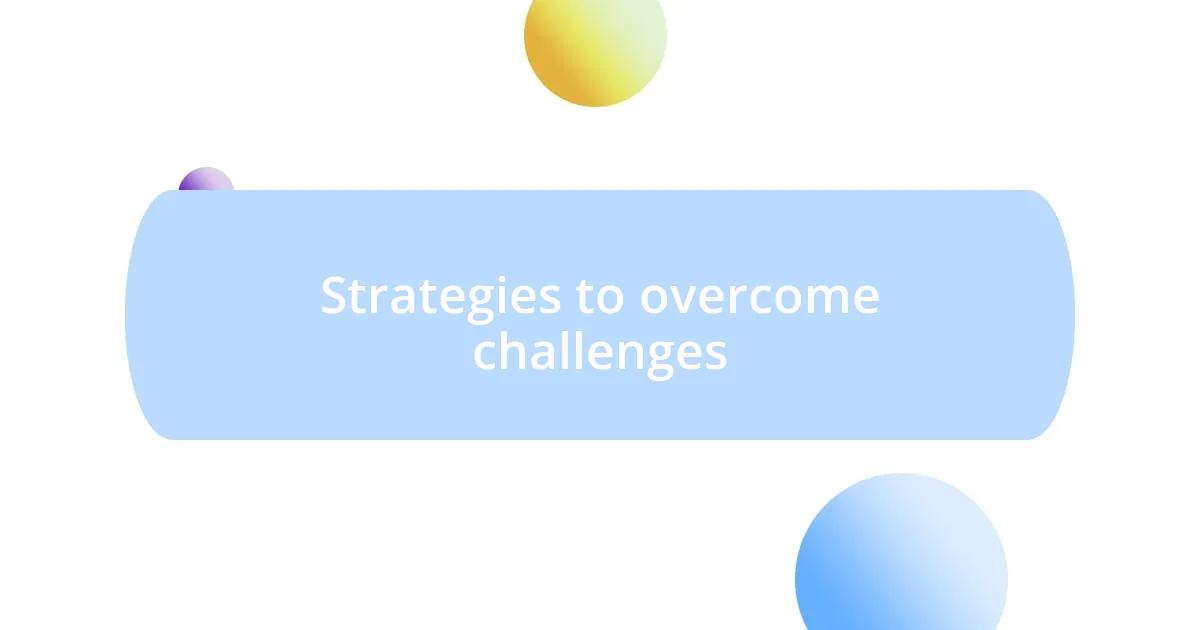
Strategies to overcome challenges
When preparing to tackle challenges, one effective strategy is to break them down into smaller, manageable tasks. I remember when I faced a significant work project that felt overwhelming at first glance. Instead of getting paralyzed by the sheer size of it, I focused on one task at a time. It’s that feeling of accomplishment with each completed step that motivated me to keep pushing forward. Have you ever felt the weight of a large goal? Breaking it down allows you to celebrate those small victories, which can boost your confidence immensely.
Another powerful approach is to develop a positive self-talk practice. I’ve noticed how often we can be our own harshest critics, especially during tough times. I’ve made it a habit to challenge negative thoughts with affirmations. When I felt like giving up during a challenging period in my life, repeating phrases like “I am capable” and “this too shall pass” helped shift my mindset from despair to determination. It’s incredible how a simple internal dialogue can reshape your perception of obstacles—isn’t it worth trying?
Lastly, seeking external perspectives can provide clarity and reduce isolation. I’ve often turned to mentors or trusted friends when I hit a wall. Their insights not only illuminated blind spots I hadn’t considered but also reminded me that I’m not alone in my struggles. One friend once said, “Every challenge has a solution; sometimes, you just need a different pair of eyes.” I genuinely believe that this exchange of ideas not only fosters resilience but also builds a sense of community, making challenges feel a little less daunting. Have you reached out before when facing a difficult situation? You might find that others have valuable experiences to share that can spark new strategies for your own journey.
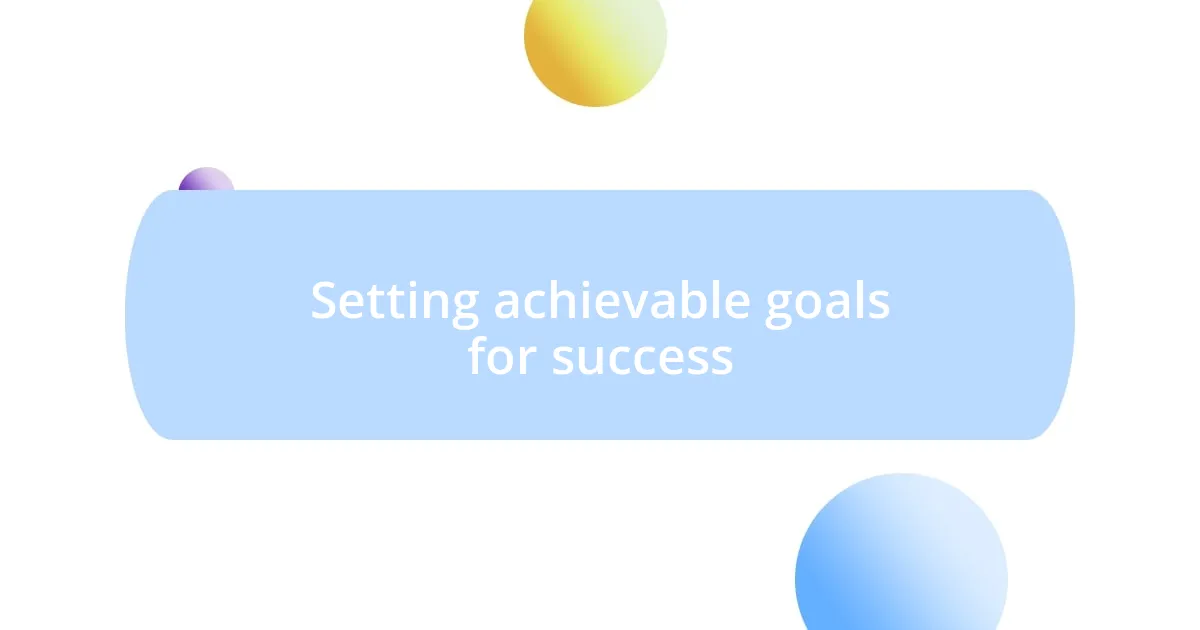
Setting achievable goals for success
Setting achievable goals is more than just a task—it’s a journey that requires intention and clarity. I vividly recall setting a hefty goal to run a marathon. Instead of jumping directly into the full distance, I broke it down. I started by planning to run a 5K, then a 10K, gradually building my stamina. Celebrating those smaller milestones not only made the process enjoyable but kept my motivation high. Have you thought about how small victories can lead to bigger accomplishments?
When I set my sights on something ambitious, I always ensure my goals are SMART: Specific, Measurable, Achievable, Relevant, and Time-bound. This approach gives me a clear roadmap. During a challenging professional phase, I aimed for a promotion. I outlined specific skills I needed to develop and set timelines for each goal. Tracking my progress felt rewarding and reinforced my commitment. Do you track your progress in any way to stay on course?
Lastly, I emphasize the importance of flexibility. Goals can evolve based on experiences and changing circumstances. I once aimed to lead a project that ultimately didn’t pan out as I envisioned. Instead of viewing it as a failure, I took a step back and reassessed my objectives. This adaptability allowed me to redirect my efforts to another opportunity that turned out to be even more fulfilling. How do you adapt your goals when unforeseen challenges arise?
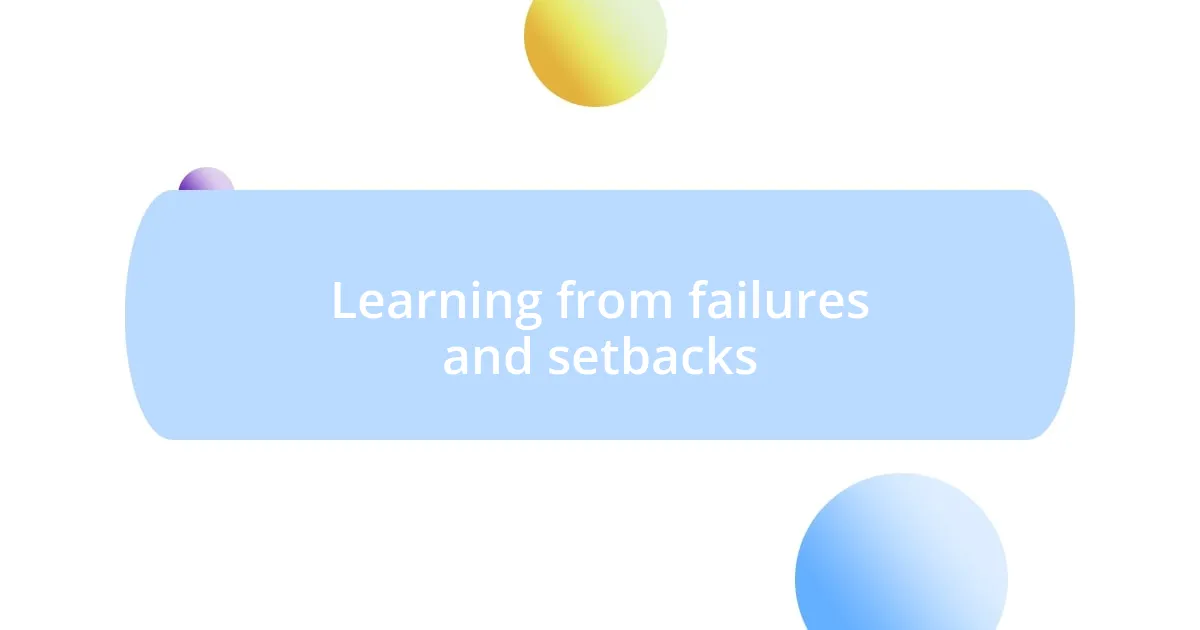
Learning from failures and setbacks
Learning from failures can often be the bedrock of future success. I remember a time I poured my heart into a project at work, only to watch it flop spectacularly. At first, it felt like the end of the world, but as I reflected, I realized that I had learned more from that setback than from any past triumphs. Each misstep uncovered what didn’t work, guiding me toward a clearer path forward. Have you ever had a similar experience where failure taught you something invaluable?
Setbacks can also serve as precious moments of redirection. I once didn’t make the cut for a job I really wanted, and I felt crushed. Yet, that disappointment led me to seek out skill-building opportunities I wouldn’t have considered otherwise. I enrolled in courses that ultimately set me up for a more suitable position later. Isn’t it amazing how a setback can pivot us onto a better trajectory?
Sharing the lessons learned from failure can also create powerful connections. I often tell friends about my ups and downs. By being open about my struggles, I’ve inspired others to share their own stories. This exchange fostered a sense of community, reminding us that setbacks are part of growth. Have you found that sharing your experiences helps not only you but those around you? It certainly has for me.
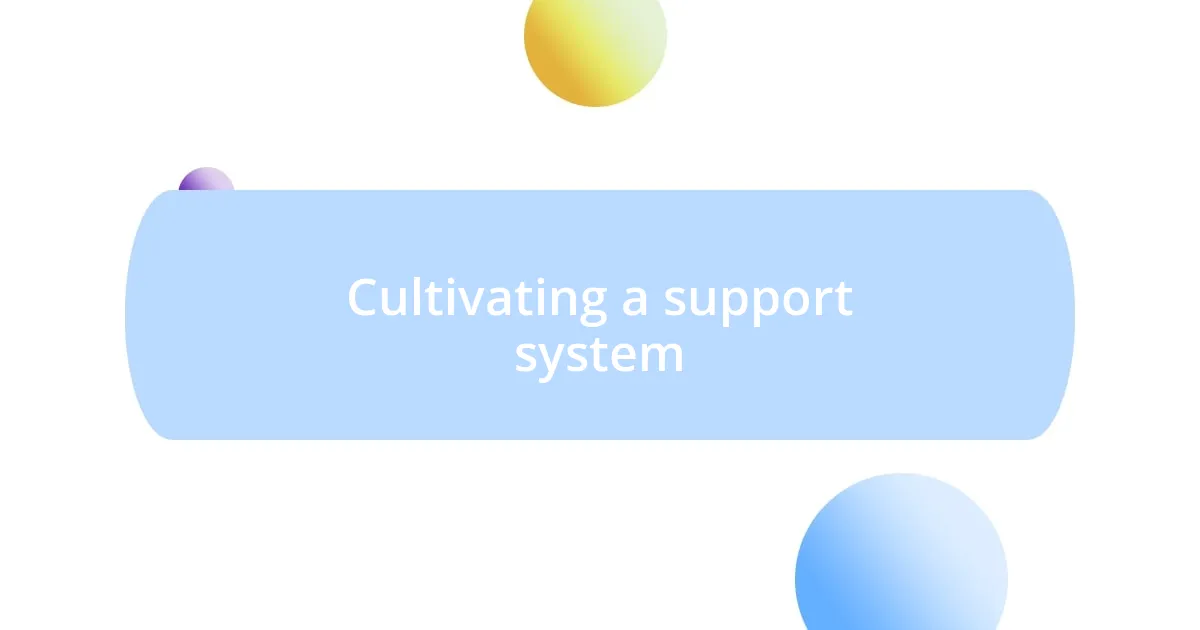
Cultivating a support system
Cultivating a strong support system has been one of the most impactful decisions in my journey toward resilience. I vividly remember when I was struggling with a personal challenge; reaching out to friends and family provided me with a fresh perspective that I hadn’t considered. Have you ever noticed how the right words from someone who cares can completely shift your mindset?
As I navigated through tough times, I learned that sharing my experiences not only lightened my emotional load but also deepened my connections with others. I would often gather with a small group to talk openly about our challenges and triumphs. Those conversations didn’t just help me feel supported; they also fostered a sense of belonging. Wouldn’t you agree that creating an environment where vulnerability is welcomed fosters growth?
Over time, I realized the importance of mutual support. Just as I sought help, I made it a point to be there for others. Recently, a friend of mine was going through a rough patch, and simply listening made a world of difference. It’s a beautiful cycle—when you invest in others, you reinforce your own resilience. How do you contribute to the support systems around you?












